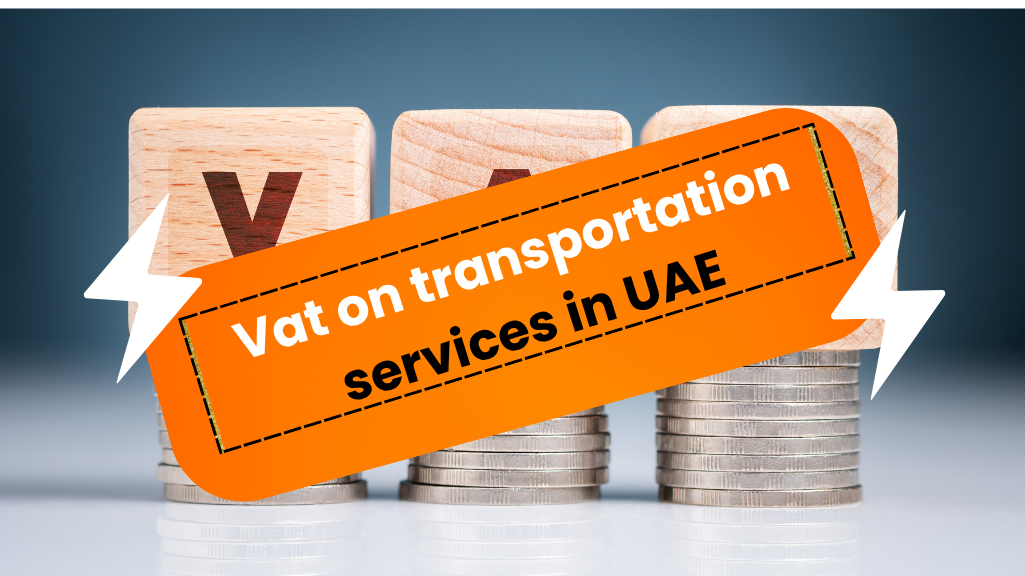The UAE continues to solidify its position as a global logistics and trade hub. It follows that, for UK businesses engaged in either import, export, or supply chain activities across the Middle East, knowledge of specific Emirates VAT on transportation services is not negotiable. Misclassification of these services is one of the most common mistakes leading to severe penalties from the Federal Tax Authority (FTA).
Is the supply of goods zero-rated at 0%, or is it subject to the standard Dubai VAT rate of 5%? The answer lies in the tight 'Place of Supply' rules.
In this comprehensive guide brought to you by Flyingcolour®, learn how to navigate the intricacies of United Arab Emirates Taxation concerning transport: what constitutes the necessary criteria for zero-rating and where the full 5% rate applies. We'll show you why expert advice is the best defence against compliance failure.
The Core Principle: Understanding VAT on Goods vs. Services
The UAE introduced Value Added Tax, or VAT, in January 2018, at a standard rate in Dubai of 5%. However, many services significant to international trade, especially transportation, are zero-rated at 0%, provided strict criteria are met.
Standard Rate (5%) vs. Zero Rate (0%)
|
VAT Rate |
Application |
Key Characteristic |
|
5% (Standard) |
This tax applies to most goods and services consumed domestically within the UAE. |
Final domestic consumption or supply. |
|
0% (Zero-Rated) |
Applies mainly to exported goods, international transportation, and some financial, health care, and educational services. |
Goods or services that are destined for consumption outside the UAE or are of crucial importance for the national economy. |
For a UK importer, the proper classification of the various charges levied by freight forwarders, shipping agents, and courier companies determines whether the UAE supplier should charge you 5% VAT or 0%. Get it wrong, and either VAT is incorrectly paid (increasing your cost) or incorrectly zero-rated (exposing the local supplier and possibly your entity to fines).
International Transportation: The Zero-Rated Lifeline
The UAE's objective is to stimulate international trade. Thus, as a general rule, the supply of goods or passengers that crosses a border is treated favorably under Emirates VAT law.
Criteria for Zero-Rating (0% VAT)
These two basic criteria must be met in order for transportation services to be zero-rated:
- Transportation of Goods/Passengers: The service must be directly related to the transport of goods or passengers.
- International Nature: The transportation must start or end outside the UAE. The definition is broad and includes movement:
- From a place outside the UAE to a place in the UAE (Import).
- From a place in UAE to a place outside UAE (Export).
- Transit from a place outside the UAE to another place outside the UAE.
Ancillary Services Related to International Transport (0% VAT)
Crucially, many services supplied as ancillary to the principal supply of international freight transport are also zero-rated, if they are essential to the completion of the transport activity. This includes:
- Customs Fees and Formalities: Charges for completing import/export documentation.
- Handling Containers: Loading, unloading, and stowing cargo onto the international vessel or aircraft.
- Storage (Temporary): Short-term warehousing of goods pending customs clearance or forwarding for the international leg of the journey.
- Insurance: Insurance covering only the process of international transport of goods.
If the UAE-based freight forwarder is correctly documenting the entire international journey, these linked services should be zero-rated.
Domestic Transport: Where 5% VAT Applies
It is considered domestic transportation and is subject to a standard Dubai VAT rate of 5% if any transportation activity initiates and terminates within the geographical boundaries of the UAE.
Common Examples Subject to 5% VAT:
|
Service Category |
Example |
Status VAT |
|
Internal Logistics |
Moving cargo from Jebel Ali Port into a Mainland warehouse in Dubai, unless the warehouse itself is a registered customs-bonded area. |
5% (Domestic movement) |
|
Inter-Emirate Transfer |
Shifting equipment from a Free Zone in Ras Al Khaimah to a client site in Abu Dhabi. |
5% (Domestic movement) |
|
Local Passenger Transport |
Taxi fares, ride-hailing services, domestic coach transfers, or short-distance ferry services. |
5% (Domestic service) |
|
Business Relocation |
Fees charged by a local removal company for shifting office furniture within Dubai. |
5% (Domestic service) |
Therefore, for the UK companies operating branches in the UAE, the proper segregation of local transport costs from international shipment costs is highly essential for accurate vat accounting uae and reclaiming any local input VAT correctly.
Specialized Areas and Exceptions (Emirates Post & Courier Services)
Several areas involved in the movement of goods hold nuanced rules based on the service provider and the destination.
VAT Charges at Emirates Post
Postal and courier services need to be differentiated with caution:
- International Mail/Courier: Services that transport parcels or post from the UAE to the UK, or any country outside the GCC, would qualify for international transport and hence would be zero-rated (0%).
- Domestic mail/courier: The services concerning the transport of mails or parcels only within the UAE will be taxed at the standard rate of 5%.
- The most common VAT Charges at Emirates Post relate to the domestic handling component of any service or ancillary non-transport services, such as packaging or express local delivery options. UK-based individuals receiving international parcels will only see VAT applied to the domestic delivery leg in most cases.
Air and Sea Ports
Charges by ports and airports, such as terminal handling charges, pilotage, and navigation fees, are zero-rated, but only if they refer directly to a particular international journey. Terminal charges in respect of domestic vessel movements are, however, charged at the 5% standard rate.
The Critical Role of Documentation and Compliance
Compliance with the Taxation in the United Arab Emirates relies a great deal on audit-ready documentation. Any supply of transport services is zero-rated, provided that the supplier is able to show sufficient proof that the goods or passengers have actually crossed an international border.
Documentation Requirements:
- Transport Documentation: Bills of Lading, Air Waybills, and freight consignment notes should clearly indicate origin outside the UAE and final destination outside UAE (in case of transit).
- Customs Declarations: Valid export/import documentation provided by UAE customs.
- Supplier Contracts: Contracts that clearly state the service is part of an international movement.
Failure by the supplier to maintain these records means that, retrospectively, the FTA can disallow the zero-rating and apply the 5% VAT, holding the supplier—and in some instances of reverse charge, the recipient—liable for severe penalties.
Compliance is Non-Negotiable: How Flyingcolour®
For UK importers and exporters, there is a significant administrative risk involved in trying to work within the complex zero-rating rules of Emirates VAT. A simple error in classifying a service—mistaking a 5% domestic charge for a 0% international one—can result in penalties that quickly wipe out profitability.
We turns this compliance burden into a structured and managed process for your Dubai business.
We ensure:
- Accurate Zero-Rating: We provide vat accounting uae services that review all freight and logistics invoices for accuracy in zero-rate application by the suppliers; if 5% VAT is charged, it is correctly reclaimed where applicable.
- Supplier Compliance Checks: We assist UK firms in verifying that their UAE logistics partners have the correct documentation to legally justify the zero-rating, taking care of your supply chain integrity under the United Arab Emirates Taxation regulations.
- Proactive Audit Defence: Our specialists are ready to provide audit assistance and resolve disputes regarding the application of the zero-rate on transportation before they turn into massive fines.
Partner with Flyingcolour® to ensure your logistics chain is fully compliant and optimized under UAE VAT law.
Conclusion
The VAT on Transportation Services in UAE is complex and requires expert attention, especially for international players. The zero-rate on any international movement gives considerable financial relief but is only available where the 'Place of Supply' rules are very carefully adhered to and the audit-ready documentation is maintained. For UK businesses, there is a need to understand the strict difference between the 0% zero-rated lifeline on international freight and the 5% Dubai VAT rate on domestic movements. Trust Flyingcolour® to secure your compliance and financial standing in the UAE trade environment.
FAQs:
Q1. If my UK company pays a single fee to a Dubai forwarder for shipping goods from London to a warehouse in Dubai, how is the VAT calculated?
A. The charge needs to be shared. The sea/air freight portion from London to the Dubai port is zero-rated at 0% VAT. The cost component covering the domestic leg from the Dubai port to the Dubai warehouse is subject to a standard dubai vat rate of 5%, since this constitutes a domestic transport service. Due to this, the forwarder needs to clearly break these amounts down on the invoice for correct Vat accounting UAE.
Q2. Does the zero rate apply if my goods are shipped internationally but stored long-term in a UAE Free Zone?
A. No. The zero-rate covers temporary storage ancillary to the international transport. If goods are stored long-term in a Free Zone (i.e., held for resale into the local market or held indefinitely), generally the storage fee becomes subject to the 5% VAT rate, except in cases where the Free Zone is a specific designated zone where supply of goods is outside the scope of VAT.
Q3. I paid a VAT Charges at Emirates Post fee for a package from the UK. Why did I pay VAT?
A. You probably paid VAT on local services provided by Emirates Post in the UAE because, although the international postal fee is zero-rated, any service that occurred after the package has cleared customs and entered the domestic supply chain—such as local delivery, expedited domestic handling, or packaging services—is subject to the standard 5% VAT.
Q4. If I charter a flight from Dubai to London for business, does the 0% zero-rate apply to the passenger transport fee?
A. Yes, the supply of air passenger transport from a place in U AE to a place outside UAE would fall under zero-rated (0% VAT), as this helps support the international travel industry within the framework of Taxation in the United Arab Emirates .
Q5. What are the documents that prove zero rating of services by an international supplier?
A. The supplier should be in possession of official transport documentation (Air Waybill or Bill of Lading), which clearly proves that the origin and destination cross the UAE border—supported by the relevant customs documentation showing that goods were actually exported/imported. Without these, the FTA may re-characterize the supply at the Dubai VAT rate of 5%.
To learn more about Value-added tax on transportation services in UAE, book a free consultation with one of the Flyingcolour team advisors.
Disclaimer: The information provided in this blog is based on our understanding of current tax laws and regulations. It is intended for general informational purposes only and does not constitute professional tax advice, consultation, or representation. The author and publisher are not responsible for any errors or omissions, or for any actions taken based on the information contained in this blog.


